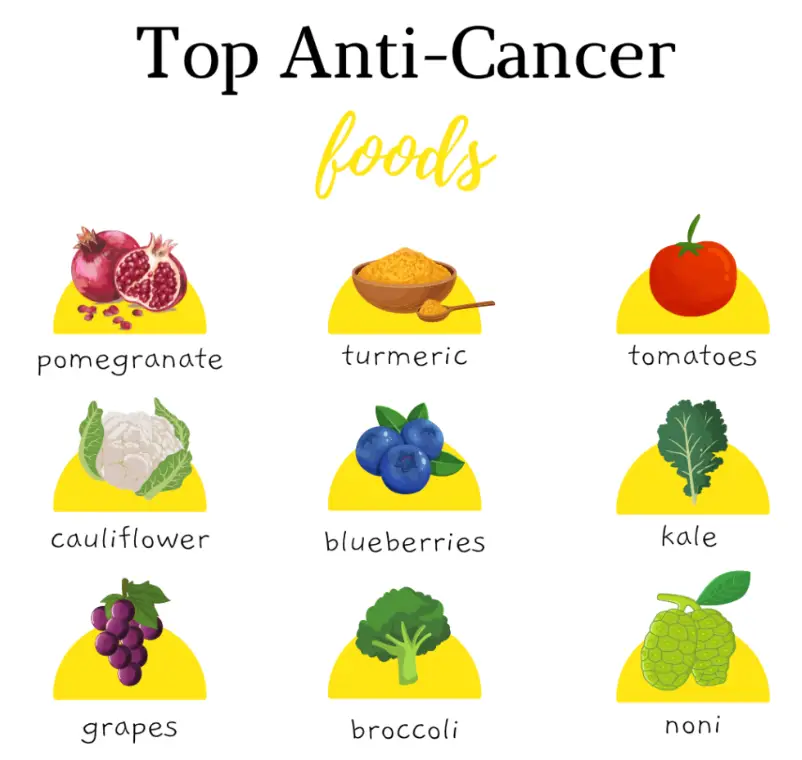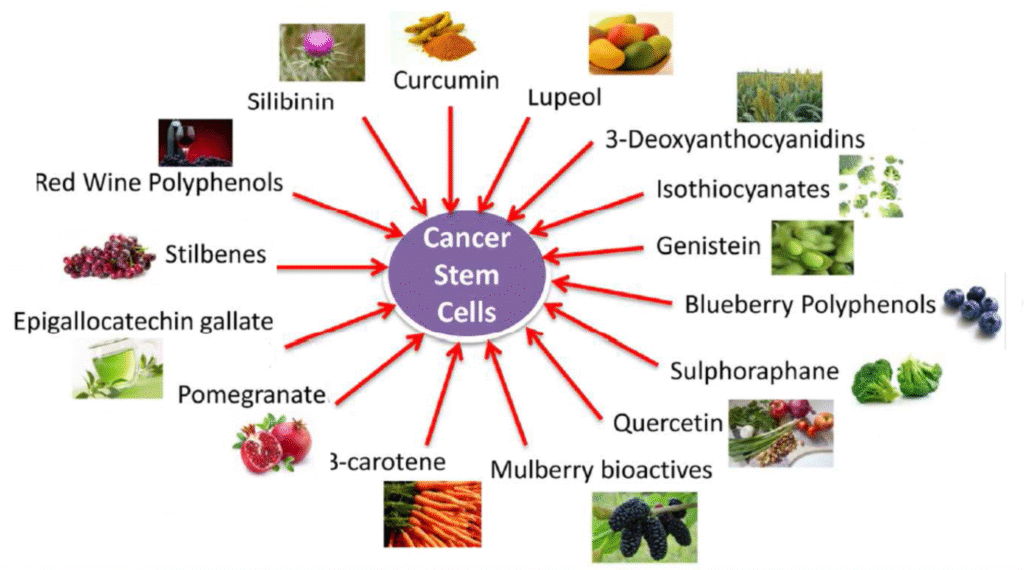
Discover the top 10 anti-cancer foods backed by science that can help reduce your risk, support treatment, and promote long-term health.
Cancer is one of the leading causes of death worldwide, with millions of people diagnosed every year. Whether you’re looking to prevent cancer, actively fighting it, or a survivor seeking to lower the risk of recurrence, understanding the role of nutrition is crucial. Scientific research continues to reveal that diet, lifestyle, and environmental factors play a substantial role in cancer development and prevention.
A major study published in The Lancet found that 30-50% of cancer deaths from 2010 to 2019 were linked to modifiable risk factors like smoking, alcohol consumption, and obesity. The Lancet This makes it clear that lifestyle choices, especially diet, can have a profound impact on cancer outcomes.
In this article, we’ll explore the top 10 anti-cancer foods and explain how each one helps in reducing cancer risk or aiding in recovery. Let’s begin by briefly understanding how cancer develops.
How Cancer Develops: A Simplified Overview
Cancer begins with damage to the DNA in our cells. This damage can occur due to inherited genetic mutations or environmental exposures such as:
- Oxidative stress (excess free radicals)
- Chronic inflammation
- Carcinogens (from smoking, processed foods, etc.)
Once the DNA damage occurs, abnormal cells can begin to multiply uncontrollably. To support their rapid growth, cancer cells release molecules that promote inflammation and the development of new blood vessels (angiogenesis), especially via vascular endothelial growth factor (VEGF). This allows them to access nutrients and oxygen, fueling their spread.
The good news? Many foods have been shown in laboratory studies to counteract these cancerous processes. Let’s take a closer look.

Top 10 Anti-Cancer Foods
1. Cruciferous Vegetables
Cruciferous vegetables include broccoli, cauliflower, kale, Brussels sprouts, and cabbage. These vegetables contain glucosinolates, which break down into compounds like isothiocyanates and indoles that:
- Inhibit cancer cell growth
- Prevent DNA damage
- Induce apoptosis (cell death) of cancer cells
Example:
Broccoli contains sulforaphane, a powerful compound shown to reduce the risk of prostate, breast, colon, and oral cancers. (Johns Hopkins Medicine)
2. Berries
Blueberries, strawberries, raspberries, and blackberries are antioxidant powerhouses packed with anthocyanins, which give them their vibrant color.
Benefits:
- Reduce oxidative stress
- Inhibit cancer cell proliferation
- Anti-inflammatory effects
Research Highlight:
Studies suggest regular berry consumption may reduce risks of colon, breast, and prostate cancers. (NIH on Anthocyanins)
3. Tomatoes
Tomatoes are rich in lycopene, a potent antioxidant that gives them their red hue.
How it helps:
- Neutralizes free radicals
- Inhibits cancer cell growth
- Prevents angiogenesis (formation of new blood vessels)
Pro Tip:
Cooked tomatoes (e.g., in sauce) have higher bioavailability of lycopene than raw ones.
4. Green Tea
Green tea contains catechins, especially epigallocatechin gallate (EGCG), which has been shown to:
- Inhibit tumor growth
- Induce apoptosis
- Prevent metastasis (spread of cancer)
Fun Fact: People in countries with high green tea consumption tend to have lower overall cancer rates. (PubMed)
5. Garlic and Onions
Members of the allium family like garlic and onions are rich in sulfur-containing compounds (e.g., allicin).
Benefits:
- Antioxidant and anti-inflammatory properties
- Induce cancer cell death
- Inhibit angiogenesis
Garlic has also been shown to support heart health and reduce blood pressure.
6. Leafy Green Vegetables
Spinach, kale, Swiss chard, and collard greens are nutrient-dense and packed with fiber, folate, and chlorophyll.
Anti-Cancer Effects:
- Detoxify the body
- Neutralize free radicals
- Inhibit cancer-promoting enzymes
Tip:
Add leafy greens to smoothies or salads daily for a cancer-fighting boost.
7. Turmeric (Bonus Entry)
Curcumin, the active compound in turmeric, has extensive research supporting its anti-cancer capabilities.
Properties:
- Anti-inflammatory
- Antioxidant
- Inhibits tumor cell proliferation
Combine with black pepper (piperine) to enhance absorption.
8. Walnuts
Walnuts are a rich source of alpha-linolenic acid (ALA), an omega-3 fatty acid, along with other bioactive compounds.
Key Benefits:
- Anti-inflammatory effects
- Slows tumor growth
- Supports immune function
Study Insight: Animal studies have shown that walnuts may reduce the size of tumors. (American Institute for Cancer Research)
9. Flaxseeds
Flaxseeds are packed with omega-3 fatty acids and lignans, compounds known for their hormone-balancing effects.
Why it matters:
- Particularly helpful against breast and prostate cancers
- Reduces inflammation
- Enhances detoxification
Note: Ground flaxseed is more bioavailable than whole flaxseed. Take it 1-2 hours apart from medications.
10. Green Herbs (Parsley, Cilantro, Basil)
These herbs contain a range of cancer-fighting compounds like flavonoids and carotenoids.
Example: Parsley is rich in apigenin, a flavonoid linked to reduced risks of breast, prostate, and colorectal cancers.
Making Nutrition Part of Your Anti-Cancer Strategy
While powerful medical treatments like chemotherapy, radiation, and immunotherapy are front-line interventions for cancer, food plays a crucial supportive role. Unfortunately, it’s not feasible to compare nutrition directly with chemotherapy in clinical trials. However, the synergy between diet and conventional treatment is gaining recognition in the medical field.
Actionable Tips:
- Consult your doctor before making major dietary changes.
- Incorporate a variety of these foods regularly, not just occasionally.
- Stay hydrated, sleep well, and move daily—nutrition is part of a bigger picture.
Final Thoughts: Prevention Starts on Your Plate
Cancer is complex, and there’s no single magic bullet. But by consistently choosing foods that nourish and protect your cells, you can significantly lower your risk, support your body during treatment, and thrive in recovery. The foods we choose daily are either feeding disease or fighting it.
Your Next Steps:
- Add at least three anti-cancer foods to your grocery list today
- Share this article with a loved one who could benefit
- Talk to your healthcare provider about personalized nutritional strategies
Want more tips on living a healthier, happier life? Subscribe to our newsletter and follow us on Instagram, YouTube, or your favorite platform for weekly inspiration and evidence-based wellness tips.
References:
- The Lancet – Global Cancer Burden Study
- NIH – Anthocyanins and Cancer
- PubMed – Green Tea and Cancer Prevention
- Johns Hopkins – Sulforaphane Research
- American Institute for Cancer Research
Stay informed. Stay healthy. Stay empowered.
The Legacy of Pope Francis – Globyte News